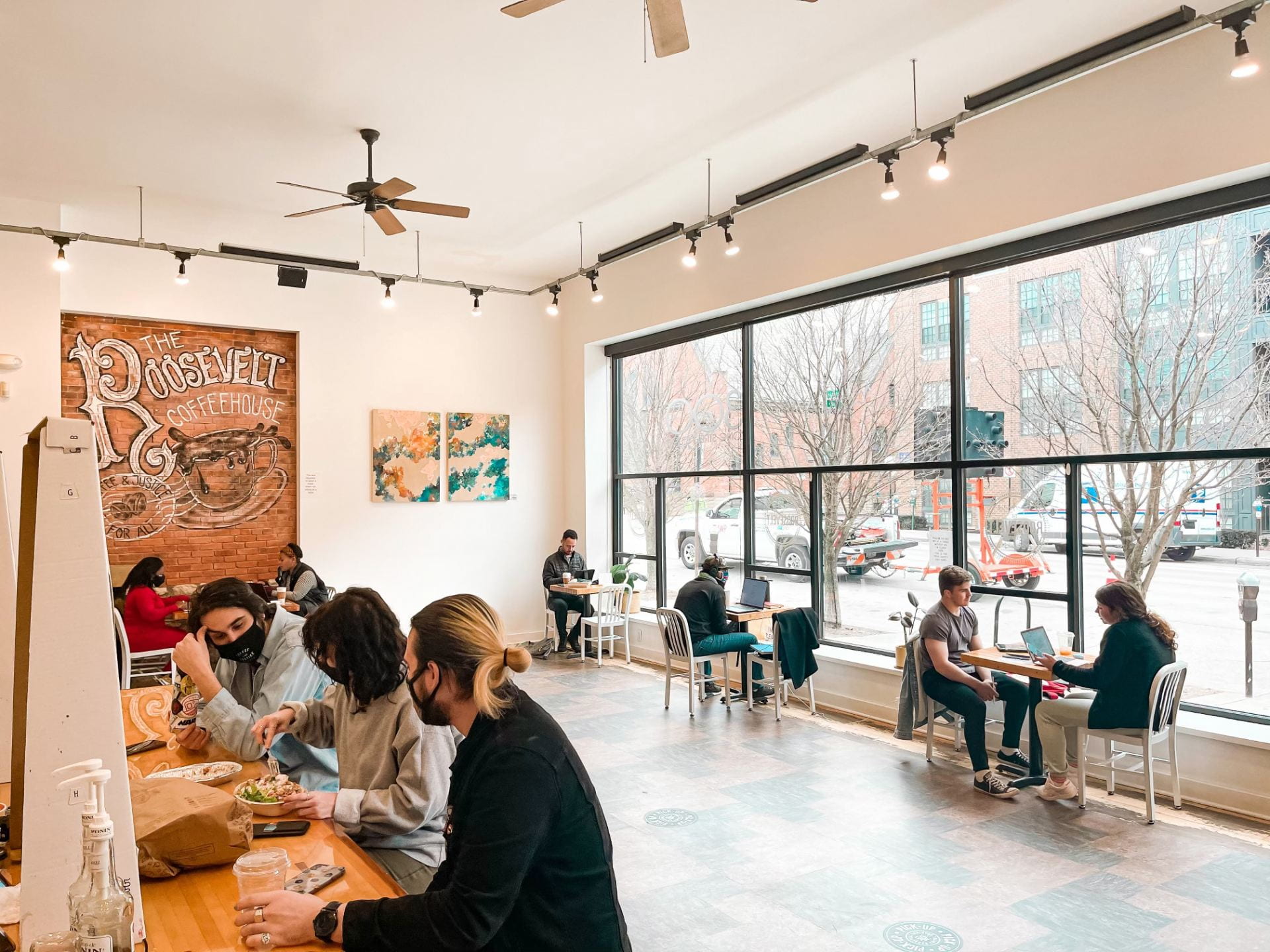The transforming society and organization of espresso in Columbus
4 min read
While the Roosevelt Coffeehouse has provided restricted seating since final August, tables for just one or two clients are sparse, and the business asks that buyers never sit for a longer time than 90 minutes. Credit score: Courtesy of Roosevelt Coffeehouse
As persons expend a lot more time at residence and considerably less time in community with buddies and spouse and children thanks to the pandemic, espresso shops across the U.S. have revised their businesses to endure a time period in which clients deficiency the regular encounter of sitting down in outlets.
Despite the fact that a lot of espresso retailers utilised to depend on beverages as a main source of profits, particularly as some buyers sat for long durations of time and purchased a number of beverages, both of those countrywide lockdowns and point out keep-at-house orders have slice retail appreciably. Kenny Sipes, the government director at the Roosevelt Coffeehouse, reported seating went from 40 p.c of their business to almost 10 %.
On the other hand, e-commerce — specially on the net income of beans for brewing at home — have amplified exponentially.
Jeff Davis, founder of Brioso Espresso, claimed he thinks the changeover from standard dine-in services to a safer setting with less in-man or woman meandering led to extra product sales than he would’ve in any other case seen.
“Our situations definitely altered, so we reacted by putting much more time and money into prioritizing something new,” Davis stated.
Sipes explained Roosevelt’s roasting firm started out providing noticeably additional luggage of coffee on the web.
“We ended up seriously not even making an attempt to do that right before the pandemic due to the fact we had more than enough wholesale accounts to retain us occupied that it was just overpowering to increase, but then it experienced to materialize,” Sipes stated.
Nevertheless, as the pandemic boosted on line purchasing, it also crushed wholesale for some companies that promote entire beans to dining establishments or other coffee retailers in the city.
“A whole lot of our partners are cafes and restaurants, so when their company started likely down, the desire for wholesale espresso definitely went down as perfectly,” Blake Moffatt, co-operator of Brioso, said.
Davis explained Brioso shed 70 % of its wholesale prospects because of short-term or long lasting closures.
“I’m genuinely sick to my abdomen stressing about places to eat and espresso stores whose entire small business is wander-in shoppers,” Davis explained. “We generally dropped all of that company-to-small business.”
The espresso marketplace also maximized the totally free time the pandemic gave them to concentrate on their roots of serving higher-high quality goods, as Sipes claimed Roosevelt uncovered goal in just its 3rd calendar year of roasting its possess beans.
“We’re last but not least setting up to perception who we are and what we want to seem like and how we want persons to encounter it,” Sipes claimed.
The pandemic has also influenced the industry’s method to discovering about coffee in just their individual companies.
“We ended up able to do a tour where by we introduced our baristas and met a environmentally friendly coffee service provider in Colombia, exactly where the coffee was processed, and we invested a few of hrs meeting them and touring the facility and inquiring thoughts — and we did it all on Zoom,” Davis claimed.
A examine by Melitta North The us, a department of a German organization that sells espresso and associated tools, surveyed consumers in the U.S. to find out how COVID-19 impacted Americans’ consumption of coffee. Forty-6 p.c of respondents said they needed to study how to brew greater espresso at dwelling.
Columbus businesses have labored around the earlier year to improve assets for citizens to brew superior coffee at home, including partnering with firms for sponsored gatherings.
“We worked with a few of corporate providers — they variety of came to us and said, ‘Hey, we want to assistance you. What if we purchased 25 bags of coffee and you all hosted a large, interactive espresso-brewing session?’” Sipes said.
Roosevelt employed people options to teach brewing approaches and the standard science of coffee to customers of their local community in a dwell, digital structure.

As COVID-19 has decreased the number of drinks Brioso Espresso sells in its store on Long Street, the company has concentrated on providing beans and tools for brewing coffee at property throughout the pandemic. Credit history: Courtesy of Brioso Espresso
Also, Sipes stated his buddy who manages the Place App, which connects volunteers with area nonprofit businesses, helped him develop a marketing campaign in which the Roosevelt Coffeehouse donated a bag of espresso to a healthcare employee for every single espresso it offered — they donated more than $25,000 in coffee in a few months.
As a team of little companies, Columbus’ espresso marketplace acknowledges that the pandemic does not just influence them individually but also the marketplace as a full, and that some adjustments may be prolonged time period.
“I believe we are unified in struggling and hoping that we can make it by this, and I never know if all of us are going to endure,” Sipes mentioned.
Not only have organizations trapped with their communities by the pandemic, but Davis reported communities have stuck with firms as very well.
“There’s a powerful sentiment each individual working day from men and women paying cash or loading reward cards or acquiring stuff, just due to the fact they want us to make it,” Davis reported.







